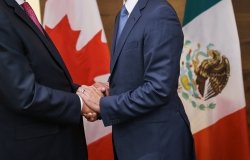NAFTA's Divergent Legacy
Wilson Center Public Policy Scholar Carol Wise argues that NAFTA's yields have not quite met its initial expectations. NAFTA, she said, may be "gradually outliving itself."
Twelve years have passed since the United States, Canada, and Mexico launched the North American Free Trade Agreement (NAFTA), an accord that should have unified a continent but has instead done little to bridge political and economic distance, argues Carol Wise, a Wilson Center public policy scholar. Wise is writing a book that compares the earlier expectations for NAFTA with its unfolding results.
"NAFTA was an amazing accomplishment that occurred at a unique moment," said Wise. "The United States sought to deepen trade and investment ties with longstanding partners and forged ahead with an impressive North American scheme." The opportunities for mutual exchange were enticing, said Wise. Canada and the United States offered an abundance of capital, skills, and technology, while Mexico brought cheap labor and geographical advantage to the negotiating table.
But the lack of institutional supports have made it difficult to fully tap these cross-border advantages. "The original expectations were unrealistic and, from Mexico's standpoint, the results have been quite disappointing," said Wise. With China looming over Canada and Mexico in the U.S. market, "NAFTA seems to be gradually outliving itself."
Unfettered access to the U.S. market, bolstered first by a bilateral free trade agreement in 1988 and again by NAFTA, helped trigger and sustain significant economic reforms in Canada. But Canada, already a G7—nowG8—member, obviously began its NAFTA membership with a leg-up as a wealthier nation. Though Canada has registered the highest growth rate in the OECD and now enjoys a budget surplus, its per capita income is still only 75 percent of U.S. levels, a shortfall that policymakers are now tackling. But unlike Mexico, said Wise, Canada's achievements have been policy induced.
For Mexico, unprecedented access to the U.S. market became more of a crutch. "Policymakers there failed to implement much-needed reforms," Wise said, "and there evolved a serious disconnect between opportunities related to NAFTA and the political will for executing crucial reforms."
Had Mexico implemented energy reform at the outset, its businesses would now enjoy much lower input costs, said Wise. Fiscal, education, and labor reform have stalled and telecom deregulation is urgently needed. "NAFTA could have done more to close the gap," Wise said, "by offering special development assistance as in the case of less developed countries like Ireland and Spain when they entered the European Union."
But in the end, Mexico's own domestic reform lag has delayed growth and per capita income gains. Mexico has benefited in highly integrated sectors like automotives and electronics, but such growth failed to spawn the local development that would amount to an authentic economic takeoff. For this to occur, she said, the incoming administration would need to implement the equivalent of a reform shock to catch up for time lost.
NAFTA's revival, Wise argues, would require that regional leaders agree to a continental strategy that taps labor markets across the three borders and invests more in infrastructure and technology transfer. This, ostensibly, was the point of the "Security and Prosperity Partnership." "Tellingly," said Wise, "this project has thus far gone nowhere."










